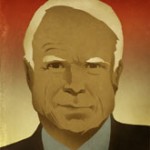McCain and the Aircraft Lobby
A labor strike at Boeing is the latest twist in a seven-year story of corruption and conflicting interests.
Jul 31, 202048.5K Shares823.3K Views
Image has not been found. URL: http://www.washingtonindependent.com/wp-content/uploads/2008/09/boeing.jpgA Boeing 777 touches down. (Flickr: News46)
At 12:01 a.m. Pacific time Saturday, 27,000 Boeing Co. machinists, protesting a lack of job security, went on strike. A lengthy walkout would halt the assembly of several pricey Boeing planes, including its 777.
The aeronautic giant’s 777 is supposed to have enough fuel capacity to win the Air Force’s most lucrative contract: a $35-billion deal to replace 179 aging aerial refueling tankers. Even before the strike, Boeing said that it needed more time to put in a contract bid.
For the past month now, the Pentagon has been unable to lay out it final bidding specifications for a contract expected to pit Boeing against the combo of Northrop Grumman and Airbus, a subsidiary of the European Aeronautic and Defense Space Co., or EADS.
Illustration by: Matt Mahurin
In February, Northrop Grumman and EADS surprisingly won the contract to build the aerial tankers. Boeing immediately filed the protest with the Government Accountability Office, the investigative arm of Congress. The company also claimed that 40,000 U.S. jobs were on the line — including ones held by the striking machinists– to make the jet aircraft and then install mounted tanks for midair refuel transfer. Boeing and its allies in Congress pointed out that Northrop Grumman/EADS tankers would at least be partly designed and built in France.
GAO had upheld the Boeing protest and voided the deal in June, assailing the Air Force for not communicating contract requirements and not accurately computing costs. Because Boeing is asking for more time to submit its latest bid, the Pentagon’s third attempt to reward the aerial tanker contract could now be delayed until the next administration.
In other words, Boeing’s labor dispute is just the latest twist in a tangled seven-year defense contracting fiasco to procure “gas stations in the sky.” But it’s also something more. It raises questions about whether Sen. John McCain (R-Ariz.), the Republican presidential nominee, is the crusader against Washington corruption that he claims to be.
In 2001, the Air Force handed the tanker contract to Boeing, the largest aircraft manufacturer in the world. But in 2005, the Air Force terminated the deal after McCain led a three-year investigation by the Senate Armed Services Committee that unearthed potentially illegal conduct by Air Force and Boeing officials. At the time, the media hailed McCain as a heroic, lonely crusader who had saved taxpayers millions of dollars.
But there may have been another side to McCain’s investigation — one that may undercut a central premise of his presidential campaign: that he will be a reformer as president.
Illustration by: Matt Mahurin
Here’s the issue. The Associated Press revealed in March that five registered lobbyists for EADS were working for McCain’s presidential campaign, including Tom Loeffler, who served as the campaign’s co-chairman. Also, in 2006, McCain wrote two strongly worded, and likely influential, letters to the Pentagon, arguing that EADS acceptance of European Union subsidies should not be factored into who gets the tanker contract.
A top McCain Senate aide, Chris Paul, has said the Arizona senator wrote the letters without lobbyist’s help and that they reflect his interest in “full and open competition.”
But McCain’s presidential campaign rarely details the Boeing investigation as evidence of his reformer bona fides. Instead, it has been mostly Democrats, with Boeing employees as constituents, who bring up the case. They highlight a different side of McCain — his campaign’s continued ties to current and former lobbyists.
The McCain-spearheaded investigation, which began in 2002, discovered that Darleen A. Druyan, then the No. 2 weapons buyer for the Air Force, had awarded Boeing a $23-billion contract to lease rather than buy 100 aerial tankers — though purchasing the aircraft would have been far cheaper.
Druyan’s reason: She was grateful that Boeing had given her daughter and her boyfriend jobs. Boeing had also promised Druyan a job. In 2005, the Air Force ended the contract. That year Druyan, along with former Boeing Chief Financial Officer Michael Sears, were sentenced to prison.
At the time, McCain’s investigation mostly got rave reviews in the media and from taxpayer watchdog groups. “It’s the best example of congressional oversight that we’ve seen in a decade,” said Keith Ashdown, vice president of Taxpayers for Common Sense. “It was before the completely bone-headed decision to bring on all those EADS lobbyists.”
EADS Lobbyists in the McCain Campaign
Chief among the EADS lobbyists was former Texas Rep. Tom Loeffler. “Loeffler has been at the intersection of special-interest money and politics for decades,” said Andrew Wheat, research director at Texans for Public Justice, a non-partisan, nonprofit policy and research organization.
Loeffler, who was finance co-chairman for George W. Bush’s 2000 presidential campaign, joined McCain’s campaign in February 2006, before McCain officially announced his candidacy. “If needed,” Loeffler said at the time, “I’ll wash bottles and change tires on the Straight Talk America van.”
McCain’s cash-strapped campaign become dependent on Loeffler, who assumed a central role as fund-raiser. In 2007, the Loeffler Group earned $220,000 lobbying for EADS. Loeffler resigned in May, when McCain purged his staff of registered lobbyists to signal that his campaign does not have conflicts of interests
While Loeffler has formally left McCain’s presidential campaign, Loeffler Group lobbyist William Ball, a former Navy secretary, remains an unpaid McCain adviser.
Meanwhile, Susan Loeffler has stayed as the campaign’s co-finance chairman and recently left her position at the Loeffler Group. The Loeffler Group said it was their policy not to talk with the press.
The other two EADS lobbyists formerly associated with McCain’s presidential campaign are Kirk Blalock, a lobbyist at Fierce, Iskowitz and Blalock and the president of Young Professionals for John McCain, and Wayne Berman, who works for Oglivy Government Relations.
Blalock, who has bundled more than $250,000 for MCain’s presidential bid, did not return calls for comment. The Arizona Republic reported that he has stayed on the campaign as an unpaid fund-raiser. A spokesman for Berman said that he no longer holds his former campaign title of deputy finance chairman, and is instead an unpaid adviser and fund-raiser.
Loeffler and the other EADS lobbyists joined McCain’s presidential campaign soon after the Arizona senator, in his capacity as chairman of the Airland Subcommittee of the Senate Armed Services Committee, asked the Pentagon to rewrite its bidding requirements for the aerial tanker program. In September 2006, the Pentagon’s request for a contract proposal was still in draft stage. But it appeared the Air Force would take into consideration a suit filed by the U.S. in the WTO court that sought to end the European Union’s policy of giving no interest loans to EADS.
McCain argued in the letter(pdf), obtained by The Washington Independent, that there was no legal right for the Air Force to include a WTO matter in the contract proposal, and that including the dispute amounted to giving Boeing the contract. On Dec. 1, 2006, McCain wrote a similar letter(pdf) to Secretary of Defense-nominee Robert Gates, who four days later appeared before McCain and the rest of the Senate Armed Services Committee for his confirmation hearings. The committee and full Senate swiftly confirmed Gates.
Indeed, after assuming his Cabinet post, Gates wrote a letter(pdf) to McCain confirming that the Pentagon’s thinking had changed — the final request for proposal would not include the WTO dispute.
McCain says that EADS lobbyists did not help write any of his letters to the Pentagon or influence his actions. But he does not deny that he used his role as a high-profile reformer and subcommittee chair to ensure Northrop Grumman/EADS could bid on the aerial tanker contract.
“I had nothing to do with the contract,” McCain said in March in response to audience questions in St. Louis, home of a Boeing plant, “except to insist in writing, on several occasions, as the process went forward, that it be fair and open and transparent.”
Criticism from Across the Aisle
Infuriated Democratic lawmakers who have Boeing employees in their districts — like Rep. Norman Dicks (D-Wash.) — have called the letters “a game changer” in tilting the second contract to Northrop Grumman/EADS.
“I hope voters of this state [Washington] remember what John McCain has done to them and their jobs,” said Dicks after the contract was rewarded. Washington state has more than 70,000 Boeing employees, including the vast majority of the machinists on strike.
The criticism hasn’t stopped. At the Democratic National Convention in Denver two weeks ago, Kansas Gov. Kathleen Sebelius, who has about 3,000 constituents employed by Boeing, said that if McCain becomes president, “the tanker will be made in England and France instead of Wichita and Seattle.” Sebelieus subsequently told Crain’s Chicago Business that, “It really comes down to a American company versus a European company.”
If Boeing wins the contract, the aircraft is expected to be modified into refueling tankers in Kansas.
McCain’s campaign press office did not return repeated calls for comment. McCain’s last statement on the contract was in July when he approved of Gates re-opening the contract and facilitating “full and open competition.” McCain did say in his presidential nomination acceptance speech Thursday at the Republican National Convention in St. Paul that he “fought crooked deals at the Pentagon.” But he did not elaborate.
“It’s tough to read McCain,” said Bill Allison, a senior fellow at the Sunlight Foundation, a nonpartisan watchdog organization seeking greater government transparency. “He’s makes a lot of moves toward reform, and the next moment does something that’s questionable.”

Rhyley Carney
Reviewer
Latest Articles
Popular Articles

